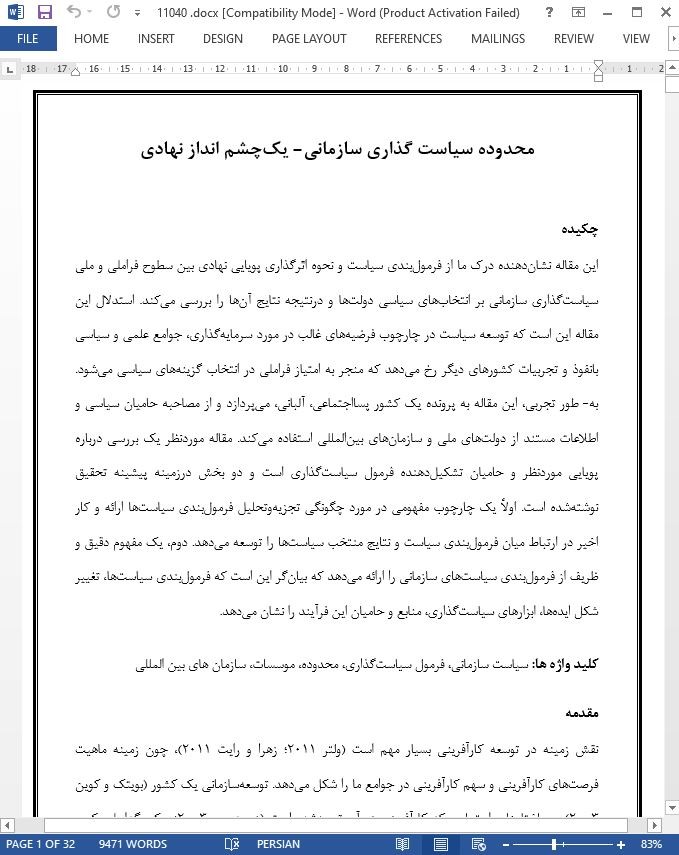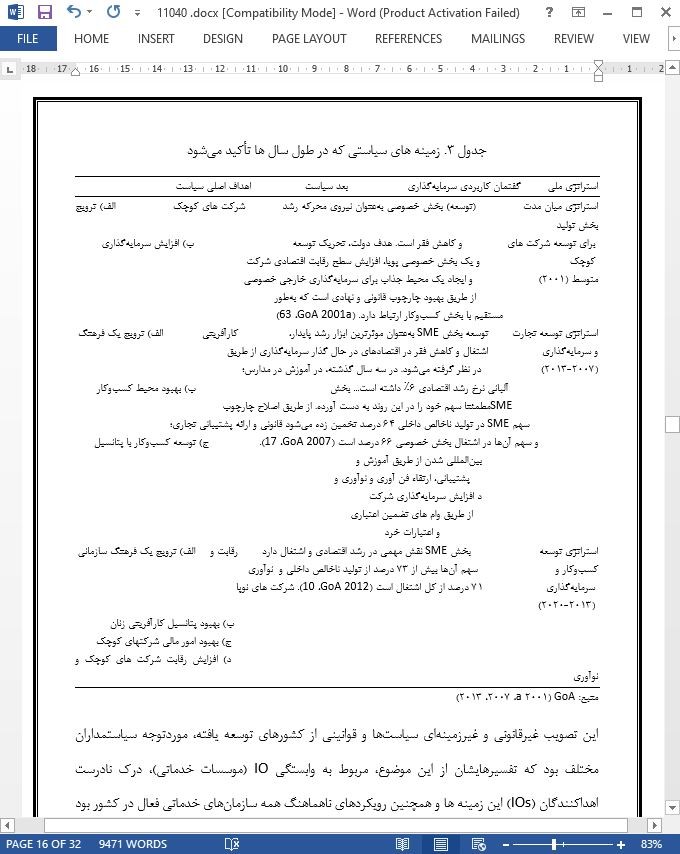
محدوده سیاست گذاری سازمانی- یک چشم انداز نهادی
چکیده
این مقاله نشاندهنده درک ما از فرمولبندی سیاست و نحوه اثرگذاری پویایی نهادی بین سطوح فراملی و ملی سیاستگذاری سازمانی بر انتخابهای سیاسی دولتها و درنتیجه نتایج آنها را بررسی میکند. استدلال این مقاله این است که توسعه سیاست در چارچوب فرضیههای غالب در مورد سرمایهگذاری، جوامع علمی و سیاسی بانفوذ و تجربیات کشورهای دیگر رخ میدهد که منجر به امتیاز فراملی در انتخاب گزینههای سیاسی میشود. به- طور تجربی، این مقاله به پرونده یک کشور پسااجتماعی، آلبانی، میپردازد و از مصاحبه حامیان سیاسی و اطلاعات مستند از دولتهای ملی و سازمانهای بینالمللی استفاده میکند. مقاله موردنظر یک بررسی درباره پویایی موردنظر و حامیان تشکیلدهنده فرمول سیاستگذاری است و دو بخش درزمینه پیشینه تحقیق نوشتهشده است. اولاً یک چارچوب مفهومی در مورد چگونگی تجزیهوتحلیل فرمولبندی سیاستها ارائه و کار اخیر در ارتباط میان فرمولبندی سیاست و نتایج منتخب سیاستها را توسعه میدهد. دوم، یک مفهوم دقیق و ظریف از فرمولبندی سیاستهای سازمانی را ارائه میدهد که بیانگر این است که فرمولبندی سیاستها، تغییر شکل ایدهها، ابزارهای سیاستگذاری، منابع و حامیان این فرآیند را نشان میدهد.
مقدمه
نقش زمینه در توسعه کارآفرینی بسیار مهم است (ولتر 2011؛ زهرا و رایت 2011)، چون زمینه ماهیت فرصتهای کارآفرینی و سهم کارآفرینی در جوامع ما را شکل میدهد. توسعهسازمانی یک کشور (بویتک و کوین 2003) و ساختارهای اجتماعی که کارآفرینی در آن تعبیهشده است (دیویدسون 2003؛ بیکر، گداجلوویک و لوباتکین 2005) سرنخهایی را برای مسیرهای مختلف کارآفرینی درزمینههای مختلف در نظر میگیرند (گارود، جمن و جولیانی 2014). دولتها تأثیر مهمی در شرایط توسعه سرمایهگذاریها دارند و محققان و دولت هر دو در کشورهای توسعهیافته و درحالتوسعه برای تأیید تناسب میان سیاستها و محیط کار کارآفرینی مذاکره کردهاند (مینییتی 2008؛ هینونن، هیتتی وکوئین 2010؛ لندستروم و همکاران 2014). این اغلب بهصورت فراخوانی و یا تلاش محققان برای تصور تفاوتهای زمینهای در توضیح نتایج سیاستها بیان میشود (پارکر 2008؛ زنتی و کیتینگ 2011؛ میسون و براون 2013؛ اکس، اوتیو و زرب 2014؛ سمالبون، ولتر و آتلیوویچ 2014).
نتیجه گیری
هدف ما در این مقاله، کشف فرمول سیاست سرمایه گذاری با در نظر گرفتن دید وسیع تری از زمینه سیاست گذاری است. این یک فرض است که ممکن است امتیازدهی زمینه فراملیتی در هنگام تدوین سیاست های سازمانی بر گزینه های سیاست و اثربخشی آن تأثیر بگذارد؛ ما از یک دیدگاه نهادی نوین همراه با یک روش تفسیری تجزیه و تحلیل سیاست برای درک چگونگی تعامل سیاستمداران و عوامل در سطح ملی و بین المللی استفاده می کنیم.
با استفاده از داده های کیفی از دو مطالعه، در مورد توسعه سیاست های سازمانی و تعدادی از اسناد سیاست در یک زمینه پساسوسیالیستی تحت تغییرات نهادی - آلبانی، به ما اجازه می دهد تا به دو روش اصلی ادبیات انتقادی را در مورد سیاست های سازمانی گسترش دهیم.اولا ما یک چارچوب مفهومی را توسعه می دهیم که فرمول سیاستگذاری را توسط کارسازمانی سیاستمداران در سطوح فراملی و ملی سیاست گذاری سازمانی شکل می دهد.
Abstract
This paper advances our understanding of policy formulation, exploring how the particular institutional dynamics between the transnational and national levels of enterprise policy-making affect policy choices made by governments and consequently their outcomes. The paper argues that policy development occurs within a framework of dominating assumptions on enterprise, influential academic/policy communities and lesson-drawing from other countries’ experiences, which have led to a privileging of the transnational when making policy choices. Empirically, the paper draws on a post-socialist country case – Albania, and uses interviews with policy actors and documentary data from national governments and international organizations. The paper explores the dynamics involved, and the actors that shape, policy formulation and makes two contributions to the literature. First, it provides a conceptual framework on how to analyse policy formulation, extending recent work on the link between policy formulation and the intended outcomes of policies. Second, it offers a more nuanced conceptualization of enterprise policy formulation, arguing that policy formulation reflects the changing configurations of ideas, policy tools and resources, and actors involved in the process.
Introduction
The role of context in entrepreneurship development has been widely recognized (Welter 2011; Zahra and Wright 2011), as context shapes the nature of entrepreneurial opportunities and entrepreneurship’s contribution in our societies. The institutional development of a country (Boettke and Coyne 2003) and the social structures in which entrepreneurship is embedded (Davidsson 2003; Baker, Gedajlovic, and Lubatkin 2005) provide clues to the different entrepreneurial trajectories unfolding in diverse contexts (Garud, Gehman, and Giuliani 2014). Governments have a major influence on the conditions under which enterprise develops, and scholars, both in the developed and developing countries, have argued for the need to ensure there is a good fit between policies and the actual entrepreneurial environment (Minniti 2008; Heinonen, Hytti, and Cooney 2010; Lundstrom et al. 2014). This has often translated into calls for, or attempts from scholars, to take into account contextual differences in explaining policy outcomes (Parker 2008; Xheneti and Kitching 2011; Mason and Brown 2013; Acs, Autio, and Szerb 2014; Smallbone, Welter, and Ateljevic 2014).
Conclusions
Our aim in this paper has been to explore enterprise policy formulation by taking a broader view of the context where policy-making is situated. Starting from the assumption that a privileging of the transnational context when formulating enterprise policy might affect policy choices and their effectiveness, we used a neo-institutional perspective combined with an interpretive method of policy analysis to understand how the interaction of policy actors and factors at the national and international level informs policy formulation.
چکیده
مقدمه
دانش فعلی در مورد سیاستهای سرمایهگذاری
سیاستهای سرمایهگذاری بهعنوان پروژههای فراملیتی - یک چارچوب مفهومی
روش تحقیق
زمینه مطالعه - محیط کارآفرینی در آلبانی
رویکرد روششناسی
منابع اطلاعات
تحلیل دادهها
یافته ها
چارچوب و ابزارهای سیاستگذاری - کارسازمانی شناختی و هنجاری
اشکال مختلف مالی و سیاسیمداران در طول زمان
بحث
نتیجه گیری
ABSTRACT
Introduction
Current knowledge on enterprise policies
Enterprise policies as transnational projects – a conceptual framework
Research methodology
Context of the study – the entrepreneurial environment in Albania
Methodological approach
Data sources
Data analysis
Findings
Policy framing and policy tools – cognitive and normative institutional work
The different configuration of finance and policy actors over time
Discussion
Conclusions
- اصل مقاله انگلیسی با فرمت ورد (word) با قابلیت ویرایش
- ترجمه فارسی مقاله با فرمت ورد (word) با قابلیت ویرایش، بدون آرم سایت ای ترجمه
- ترجمه فارسی مقاله با فرمت pdf، بدون آرم سایت ای ترجمه



